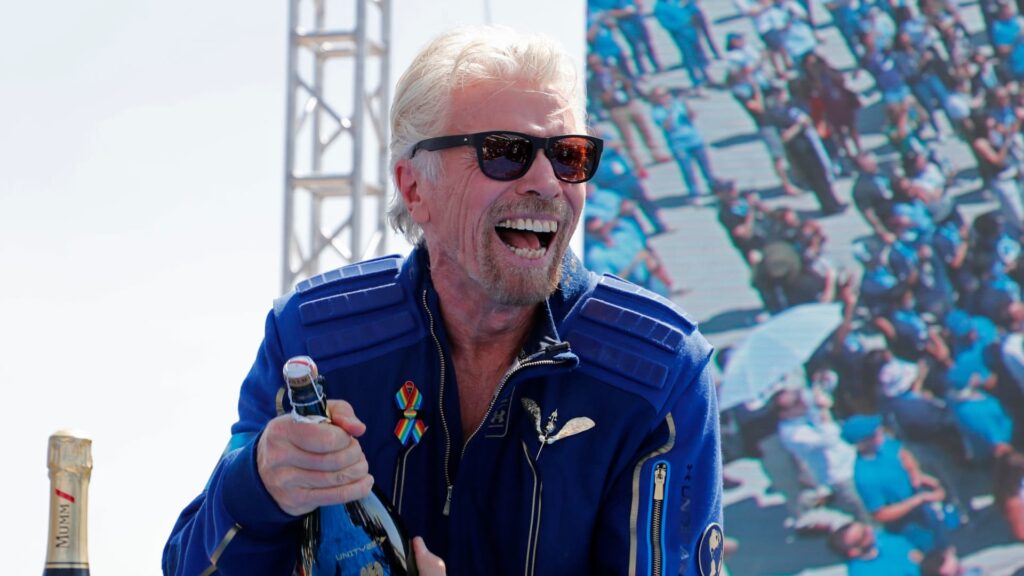Richard Branson says the biggest reason he’s a billionaire today is because he trusts his instincts — and he’s not discouraged when people tell him a new venture is “crazy” or doomed to fail.
Instead, he takes those doubts to heart: He listens to his advisors so as to consider every possible pitfall of a new venture. Once those issues are identified, Branson says he takes the necessary precautions to “protect the downside” before forging ahead.
That mindset helped the British entrepreneur push past the objections of naysayers, particularly when he strongly believes that one of his seemingly “crazy” ventures can bring something new to a market that’s ripe for disruption, Branson, 74, wrote in a LinkedIn post on April 28.
“Since we launched, there have been many occasions where people told me we’d fail. But we’ve stuck by our belief that if you can create something better than everybody else, then you at least have a chance of succeeding,” Branson wrote.
DON’T MISS: A step-by-step guide to buying your first home—and avoiding costly mistakes
Branson’s risky decision to launch Virgin Atlantic in 1984 is a prime example of the billionaire’s philosophy, he wrote in the LinkedIn post. “People thought we were crazy to launch an airline,” wrote Branson. “I went against everyone’s advice. Friends, experts, the press, the pundits — and on paper, they were right.”
He “had no idea how the aviation world worked” at the time, having previously only worked in the music industry since founding Virgin Records more than a decade earlier, he wrote. But he was convinced that he could improve upon the flying experience offered by most traditional airlines, mostly because it was so “subpar,” he noted.
It was a huge challenge — one that Branson acknowledged “was very risky” due to the fact that he was taking on much larger, established rivals in a highly competitive industry, he told CNBC Make It in April 2024.
Branson took those risks seriously. Rather than dismiss anyone who disagrees with him, Branson advocates for surrounding himself with intelligent people and then spending “as much time as possible listening” to alternative points of view, he wrote on LinkedIn in February 2015.
He also negotiates escape hatches, in case he’s wrong. In the case of Virgin Atlantic, that meant starting the company by leasing just a single 747 aircraft from Boeing:
“In case my instinct was wrong, I negotiated the right to hand [Virgin’s first plane] back to Boeing at the end of the first year,” Branson said. “The most the airline was actually going to cost — apart from my reputation, which is obviously very important — was roughly a year’s profits at Virgin Records.”
‘You don’t need to stay in your lane’
Branson’s instincts ultimately paid off: Virgin Atlantic is still in business after more than four decades. It has overcome ups and downs, even emerging from bankruptcy proceedings in 2021. The business posted record annual revenue of nearly $4.5 billion in 2024 that returned the company to profitability, it announced on March 31.
“Virgin Atlantic is proof that you don’t need to stay in your lane,” Branson wrote in his LinkedIn post.
Not every decision has been a success. Branson launched some short-lived brands, like Virgin Cola and Virgin Clothing, that never panned out.
Even Branson’s spaceflight play, Virgin Galactic, has suffered “significant losses since inception,” including losing $346 million in 2024, the company said in its annual report in February. Branson mitigated the risk to Virgin Group by selling the bulk of its stake in the public space tourism company to investors.
Today, Branson’s estimated net worth is $2.8 billion, according to Forbes. “There’s many things that we’ve done that we wouldn’t have done if we’d listened to accountants,” he told CNBC Make It.
Are you ready to buy a house? Take Smarter by CNBC Make It’s new online course How to Buy Your First Home. Expert instructors will help you weigh the cost of renting vs. buying, financially prepare, and confidently navigate every step of the process—from mortgage basics to closing the deal. Sign up today and use coupon code EARLYBIRD for an introductory discount of 30% off $97 (+taxes and fees) through July 15, 2025.
Plus, sign up for CNBC Make It’s newsletter to get tips and tricks for success at work, with money and in life, and request to join our exclusive community on LinkedIn to connect with experts and peers.


